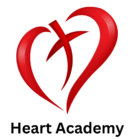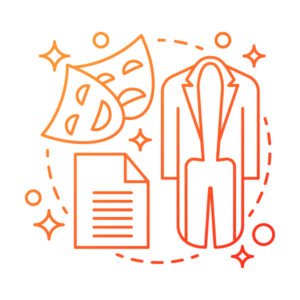- Course Title: World Literature & Composition
- Mentor-Teacher: Denise Boiko
- Course Length: Two Semesters
- Type of Class: Group class through HEART Academy
When: Fridays, 12:25-1:40
- Cost: $75/ month
- Credit Classification: 10 credits of English
- Materials Fee: $5, one time only. Essay grading fee, $25, one time only.
- Minimum & Maximum Class Size: 8 and 16
- Questions: Email Denise Boiko at dboiko12@gmail.com or phone (408)375-5189
- Prerequisite: High school level reading and writing skills. Recommended grade level: 9th-12th but advanced 8th
- graders are welcome. Experience with Institute for Excellence in Writing (or equivalent training in style) at junior high or high school level, OR HEART Academy writing class at junior high or high school level, OR another high school English course with writing. If in doubt about a student’s readiness, parents may submit a previous essay by the student for teacher’s evaluation. 254
Other requirements
- Use of basic technology applications (word processing applications, email, internet research).
- A willingness to work on writing assignments each school day during the week. In addition to class time, this subject will require a workload of at least one hour a day, five days a week, 120 hours for the year.
- Students should be prepared to write at least one 2-4 page typed essay every 3-4 weeks and to revise previously written essays.
Course Format: If HEART meets in person, the class will meet in person. If social distancing is mandated, the class will meet via Zoom.
Course Description
World Literature and Composition will guide high school students as they read, enjoy, discuss, and analyze a spectrum of literary selections from worldwide authors and poets of various eras. Genres will include short stories, novels, nonfiction, poetry, and drama. Students will learn literary terms and study the rhetorical techniques authors use to communicate their messages. For each fiction work, students will analyze character, plot, setting, conflict, point of view, and theme, and will look for features such as irony, foreshadowing, and symbolism. For nonfiction works, students will learn to read critically and extract important points. For poetry, students will study typical patterns and techniques the poet uses to convey meaning.
Students will practice techniques of composition such as prewriting, outlining, drafting, revision, and editing. Various types of compositions will be written, such as descriptive/narrative, comparison/contrast, theme-based literary analysis, and a research paper with MLA formatting. All essays will be revised before being considered final. Students will learn about paragraph structure, thesis and topic sentence techniques, organization, style, mechanics, transitions, parallelism, variety in sentence patterns, and other key writing skills. Each semester, students will write and revise three to four essays, and will complete one creative project per semester. Essays will be scored using a detailed rubric analyzing the student’s accomplishments in the areas of content, organization, style, and mechanics.
A typical class period will include discussion of literature selections the students have been reading, occasional comprehension quiz games (some designed by students), and the sharing of creative projects students have produced to showcase their understanding of the literature they have just read. Each class period will also include a brief time of writing instruction.
Levels of course available
Students may take this course at a standard college prep level or at an honors level. Honors level students will be required to write one additional essay per semester as compared to standard college prep students. Honors students’ work will also be held to a higher standard during the grading process.
Class Expectations
–Attendance and punctuality (very important). Please be in class on time, ready to start, and prepared for the day’s material.
–Preparation of annotation notes for each week’s reading.
–Participation in discussion.
–Timely completion of assigned reading, essays, projects, and other homework. Specific assignments will be given weekly by email and/or by handout. Please stay caught up!
–You will work on your own with your parent’s help (as needed) during the week.
My commitment as your instructor is to provide weekly instruction, help, and encouragement to you and to evaluate your work. Please feel free to come to me with questions or email me during the week, so that this can be a team effort in learning together.
Handing in Assignments
Assignments are due at the beginning of class. All work should be done neatly and reflect your best efforts. Strive for excellence and do your best work. Extra credit will be available for students who need to enhance their grades. Extra projects are also available for students with special interests, gifts, or those needing a more advanced course – please ask instructor.
Bring to class every day
1. A folder or small 3-ring binder with pocket folders in which to keep notes and handouts. Folder should con-
tain about 20 sheets of college ruled notebook paper.
2. Pens and/or pencils.
3. Current book being read and discussed.
4. Homework to turn in. 319
Other supplies needed:
A good dictionary and thesaurus (online is fine).
Highlighters for marking interesting passages (only if you own the book and don’t mind marking in it).
Post-It Notes for marking important passages of books you do not own or do not want to mark up.
World Literature and Composition Workload
A typical weekly workload will be:
Read several chapters of the book being discussed and complete one page of informal annotation notes per week.
Discuss the section of the book in class and gain insights from each other.
Plan and prepare your essay or project (upon completion of a book or literary work).
For the project assignments, students will be provided with a long list of project ideas from which to choose.
Project ideas are numerous and could include the following (this is just a small sample of the list that will be available):
Writing projects
- Writing journal entries of one of the characters
- Writing a dramatization of a certain episode from the book
Presentation/speaking projects
- Presenting an advertisement to encourage people to read the book
- “Interviewing” a character or the author
Hands-on projects
- Constructing a board game or Jeopardy game relating to the book
- Making a short video relating to the book or the author
- Creating a website relating to the book
Artistic projects
- Painting, drawing, or sculpting scenes from the book
- Making a diorama about the book
Miscellaneous projects
- Writing quiz questions to try to stump the class
- Making a map or timeline of the story
Evaluation and Assessment
Each essay and project, as well as the student’s alertness and participation in weekly discussions, will be evaluated. Evaluations will be based on effort, enthusiasm, participation, and improvement in comprehension and writing skills.
Parent involvement in discussion and evaluation of student’s work is strongly encouraged, and the teacher will be available to parents as needed, to assist in evaluating performance against priorities, to answer questions, or simply to be a sounding board for discussion.
As needed by individual families, a teacher-created evaluation will be provided for the student, which may be
used as an aid to help parents determine grades for report cards. End-of-semester evaluations will be largely based upon displaying consistent and measurable improvement and effort throughout the year. Evaluations may include the number of assignments completed, a description of challenges and accomplishments, a review of student’s progress and performance, and/or an average percentage score for the semester. The basis for this assessment will be the following items (this is an approximate breakdown and is subject to change):
Literature essays/projects and research paper: 70%
In-Class effort, discussion, and participation, including annotations: 30%
Extra credit, as applicable (will add on to student’s existing point total and can be done with extra projects for assigned books, or optional books read and reported on).
Reading List
PLEASE EMAIL INSTRUCTOR DURING THE SUMMER TO RECEIVE READING SCHEDULE AND ADDITIONAL INFORMATION REGARDING ANNOTATIONS
- Selected short stories (Leo Tolstoy and others)
- The Death of Ivan Ilych by Leo Tolstoy
- The Cherry Orchard by Anton Chekhov
- A Tale of Two Cities* by Charles Dickens *read during summer
- Selected poetry
- Selected folk tales
- Les Miserables* by Victor Hugo (unabridged or abridged version – see below) *read during summer
- Cry, the Beloved Country by Alan Paton
- The Book Thief by Markus Zusak
- The Good Earth by Pearl Buck
Curriculum
Windows to the World: An Introduction to Literary Analysis, by Lesha Myers – student book only; available through IEW or CBD.
Teacher Assistant Position
Duties: taking roll, checking off homework completion (with some minor, straightforward “pre-grading” of es-
says). You will receive a 50% discount on your student’s tuition in this class. Please contact Denise Boiko if interested.
Summer Homework:
1. Read A Tale of Two Cities by Charles Dickens. Ideally, read it once, study some online notes and commentary such as SparkNotes, and then read it again with new insight. Any edition is fine. Audio versions are fine as 1407 well, but please have access to a text version in order to find quotes for essays.
2. Read Les Miserables by Victor Hugo (abridged or unabridged). I highly recommend the 2014 translation by Julie Rose, as it flows well in smooth, more modern English compared to older translations. The Julie Rose version is excellent but extremely lengthy (1200 pages); I will provide a reading guide for sections that may be skipped or skimmed. Alternately, you may choose an abridged version (not as rich and full, but acceptable for our purposes) and I will provide ISBNs upon request. Note: you may actually have “tougher going” in an abridged version that is not as smooth a translation as Rose’s unabridged version.
Other options:
- Audio versions are fine; please have access to a text version in order to find quotes for essays.
- Viewing the 2013 film Les Miserables (parents, PLEASE preview for a couple of questionable scenes) 1419 or listening to audio of the musical will be extremely helpful in motivating students to read the book. Or, students may view the film or listen to the Broadway musical instead of reading the book, if this is the best option for the student’s learning style.
For both Les Miserables and A Tale of Two Cities, you will still have several weeks after classes start to finish reading these books, but summer is a great time to get a head start. We will discuss A Tale of Two Cities in Oct-Nov, and Les





